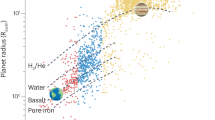Abstract
Blackburn and Seely1 have published evidence that the light from strongly shocked granular salt was largely independent of the interstitial gas. They inferred that it did not (as I had thought2,3) arise from compression of the gas, and assumed that the same conclusion would apply to detonating explosive powders. While this extrapolation is plausible, it would be advantageous to have it confirmed.
This is a preview of subscription content, access via your institution
Access options
Subscribe to this journal
Receive 51 print issues and online access
$199.00 per year
only $3.90 per issue
Buy this article
- Purchase on Springer Link
- Instant access to full article PDF
Prices may be subject to local taxes which are calculated during checkout
Similar content being viewed by others
References
Blackburn, J. H., and Seely, L. B., Nature, 194, 370 (1962).
Paterson, S., Nature, 167, 479 (1951).
Paterson, S., Fifth Intern. Symp. Combustion, 672 (Reinhold, 1955).
Blackburn, J. H., and Seely, L. B., Nature, 202, 382 (1964).
Taylor, J., Detonation in Condensed Explosives, plate 10 (Oxford, 1952).
Author information
Authors and Affiliations
Rights and permissions
About this article
Cite this article
PATERSON, S. Light from Shocked and Detonating Powders. Nature 203, 1057–1059 (1964). https://doi.org/10.1038/2031057c0
Issue Date:
DOI: https://doi.org/10.1038/2031057c0
This article is cited by
Comments
By submitting a comment you agree to abide by our Terms and Community Guidelines. If you find something abusive or that does not comply with our terms or guidelines please flag it as inappropriate.



